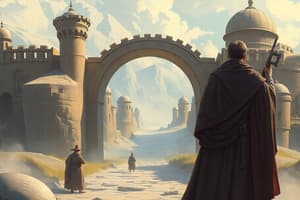Podcast
Questions and Answers
What is the primary focus of political history?
What is the primary focus of political history?
- Analyzing state affairs, leaders, and government systems (correct)
- Examining societal structures and relationships
- Studying art, religion, and daily life
- Understanding economic trends and trade systems
Which period in history is known for a revival of arts and culture?
Which period in history is known for a revival of arts and culture?
- Modern History (correct)
- Prehistory
- Ancient History
- Medieval History
What is historiography?
What is historiography?
- The chronological arrangement of events
- The analysis of economic practices
- The examination of historical writing and interpretation (correct)
- The study of ancient artifacts
Which event marked the transition into the Middle Ages in Europe?
Which event marked the transition into the Middle Ages in Europe?
What does the study of economic history include?
What does the study of economic history include?
What distinguishes primary sources from secondary sources?
What distinguishes primary sources from secondary sources?
Which figure is often referred to as the 'Father of History'?
Which figure is often referred to as the 'Father of History'?
When did the Industrial Revolution primarily occur?
When did the Industrial Revolution primarily occur?
What is the study of archaeology primarily associated with?
What is the study of archaeology primarily associated with?
Flashcards are hidden until you start studying
Study Notes
Definition of History
- Study of past events, particularly in human affairs.
- Explores social, political, economic, and cultural developments.
Importance of History
- Helps understand current society and its complexities.
- Provides insights into human behavior and societal change.
- Aids in recognizing patterns that inform future decisions.
Key Concepts in History
- Chronology: The arrangement of events in the order they occurred.
- Historical Sources:
- Primary sources (direct evidence like documents, artifacts).
- Secondary sources (interpretations like textbooks, articles).
- Historiography: The study of how history has been written and interpreted.
Major Periods in History
- Prehistory: Time before written records; studied via archaeology.
- Ancient History: From the first written records (circa 3000 BCE) to the fall of the Western Roman Empire (476 CE).
- Medieval History: Also known as the Middle Ages; roughly from 5th to late 15th century.
- Modern History: From the end of the Middle Ages to present; includes the Renaissance, Enlightenment, Industrial Revolution, and contemporary history.
Significant Historical Events
- The Agricultural Revolution: Transition from nomadic hunter-gatherer societies to settled farming.
- The Fall of Rome: Marked the transition into the Middle Ages in Europe.
- The Renaissance: A revival of arts, culture, and humanism in the 14th to 17th centuries.
- The Industrial Revolution: Transformation of manufacturing processes and economic practices in the 18th to 19th centuries.
- World Wars: Major global conflicts in the 20th century reshaping political and social landscapes.
Types of History
- Political History: Focuses on state affairs, leaders, and government systems.
- Social History: Examines societal structures, relationships, and cultural norms.
- Economic History: Looks at economies, trade systems, and financial trends.
- Cultural History: Studies the arts, religion, and daily life of past societies.
Key Figures in History
- Herodotus: Often called the "Father of History"; wrote about ancient cultures.
- Thucydides: Noted for his account of the Peloponnesian War; emphasized factual accuracy.
- Marx: Critiqued capitalism and influenced historical materialism.
- Said: Introduced concepts of Orientalism and cultural representation.
Methodologies in Historical Research
- Critical analysis of sources for credibility and bias.
- Comparative history: Examining parallels and contrasts between different societies.
- Quantitative history: Using statistical methods to analyze historical data.
Contemporary History
- Globalization effects.
- Rise of digital technology and its impact on society.
- Ongoing discussions regarding historical narratives and representation.
Challenges in History
- Interpretation bias: Different perspectives can alter understanding.
- Loss of sources: Some historical evidence may be lost or destroyed.
- Myth vs. fact: Discrepancies can arise from folklore or misinformation.
Conclusion
Understanding history is essential for contextualizing present and future issues, fostering critical thinking and empathy by learning from the successes and failures of previous societies.
Definition of History
- History is the study of past events, particularly in human affairs
- It explores social, political, economic, and cultural developments
Importance of History
- Understanding present-day society and its intricacies
- Providing insights into human behavior and societal change
- Helping people recognize patterns that inform future decisions
Key Concepts in History
- Chronology: Arrangement of events in the order they occurred
- Historical Sources:
- Primary sources - Direct evidence like documents, artifacts
- Secondary sources - Interpretations like textbooks, articles
- Historiography: The study of how history has been written and interpreted
Major Periods in History
- Prehistory: Time before written records, studied through archaeology
- Ancient History: From the first written records (circa 3000 BCE) to the fall of the Western Roman Empire (476 CE)
- Medieval History: Also known as the Middle Ages, roughly from the 5th to late 15th century
- Modern History: From the end of the Middle Ages to the present, includes the Renaissance, Enlightenment, Industrial Revolution, and contemporary history
Significant Historical Events
- The Agricultural Revolution: Transition from nomadic hunter-gatherer societies to settled farming
- The Fall of Rome: Marked the transition into the Middle Ages in Europe
- The Renaissance: Revival of arts, culture, and humanism during the 14th to 17th centuries
- The Industrial Revolution: Transformation of manufacturing processes and economic practices in the 18th to 19th centuries
- World Wars: Major global conflicts in the 20th century, reshaping political and social landscapes
Types of History
- Political History: Focuses on state affairs, leaders, and government systems
- Social History: Examines societal structures, relationships, and cultural norms
- Economic History: Looks at economies, trade systems, and financial trends
- Cultural History: Studies the arts, religion, and daily life of past societies
Key Figures in History
- Herodotus: Often called the "Father of History" for writing about ancient cultures
- Thucydides: Noted for his account of the Peloponnesian War, emphasizing factual accuracy
- Marx: Critiqued capitalism and influenced historical materialism
- Said: Introduced concepts of Orientalism and cultural representation
Methodologies in Historical Research
- Critical analysis of sources for credibility and bias
- Comparative history: Examining parallels and contrasts between different societies
- Quantitative history: Using statistical methods to analyze historical data
Contemporary History
- Effects of Globalization
- Rise of digital technology and its impact on society
- Ongoing discussions regarding historical narratives and representation
Challenges in History
- Interpretation bias: Different perspectives can alter understanding
- Loss of sources: Some historical evidence may be lost or destroyed
- Myth vs. fact: Discrepancies can arise from folklore or misinformation
Conclusion
- Understanding history is essential for contextualizing present and future issues
- Fostering critical thinking and empathy by learning from the successes and failures of previous societies
Studying That Suits You
Use AI to generate personalized quizzes and flashcards to suit your learning preferences.




